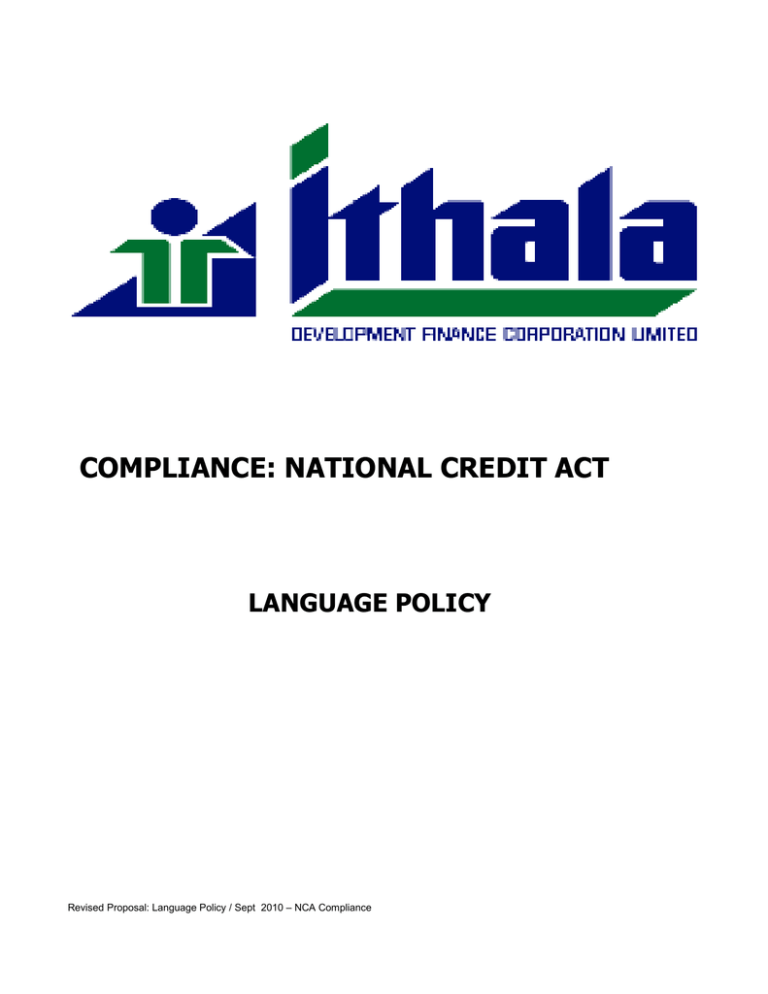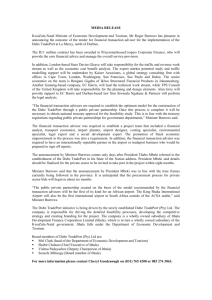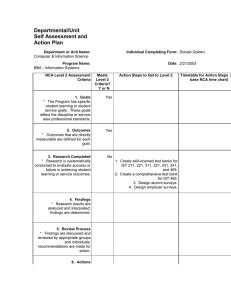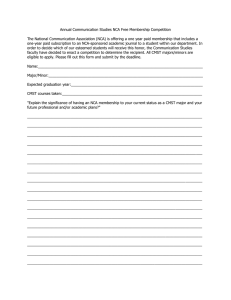COMPLIANCE: NATIONAL CREDIT ACT
advertisement

COMPLIANCE: NATIONAL CREDIT ACT LANGUAGE POLICY Revised Proposal: Language Policy / Sept 2010 – NCA Compliance TABLE OF CONTENTS 1. Introduction 2. Legal Framework 3. Key Drivers 4. Strategy for implementation 5. Conclusion Revised Proposal: Language Policy / Sept 2010 – NCA Compliance 1. INTRODUCTION 1.1 Approximately 25 different languages are spoken in South Africa, of which 11 have been granted official status in terms of section 6 of the Constitution (Act No. 108 of 1996) on the grounds that their usage includes about 98% of the total population. The 11 official languages are isiNdebele, isiXhosa, isiZulu and siSwati (referred to as the Nguni language group); Sesotho, Sepedi and Setswana (referred to as the Sotho language group); Tshivenda, Xitsonga, English and Afrikaans. 1.2 In the Kwazulu Natal Province, isiZulu and English are the dominant official languages the former being a non-indigenous language. Both these languages cater for 90% of Ithala’s client base. 1.3 The basis of Ithala’s language policy is informed by the fact that Ithala is regionally based and has to focus on the most dominant languages in the province in order to operate within the ambit of the NCA in the socio-economic and political domains of the KZN province. In creating its language policy, Ithala has to adhere to the National Language Policy Framework as issued by the Minister of Arts and Culture on 13 November 2002. 1.4 The National Policy Framework strongly encourages the utilization of the indigenous languages as official languages in order to foster and promote national unity. It takes into account the broad acceptance of linguistic diversity, social justice, the principle of equal access to public services and programmes, and respect for language rights. 1.5 Section 6 of the Constitution provides the principal legal framework for multilingualism, the development of the official languages and the promotion of respect and tolerance for South Africa’s linguistic diversity. It determines the language rights of citizens, which must be honoured through national language policies. 1.6 The Constitution emphasizes that all official languages must “enjoy parity of esteem” and be treated equitably, thereby enhancing the status and use of indigenous languages, with government taking “legislative and other measures" to regulate and monitor the use of disadvantaged indigenous languages. 1.7 The Constitution mandates change to the language situation throughout the country, giving social and political recognition to hitherto disadvantaged language groups on the basis of the expressed needs of communities and interest groups. 1.8 Section 6(2) of the Constitution requires mechanisms to be put in place to develop these indigenous languages. Revised Proposal: Language Policy / Sept 2010 – NCA Compliance 1.9 Section 6(3) and (4) contain language-related provisions for national and provincial governments, whereby government departments must use at least two of the official languages. 1.10 The Constitution and related legislation clearly advocate the promotion of multilingualism in South Africa. This policy framework must therefore cater adequately for the harmonization of language policy at all three levels of government and articulate clear policy positions on the status and use of the indigenous official languages in all nine provinces in South Africa. 1.11 Section 63 of the National Credit Act provides the following: S(1) A consumer has a right to receive any document that is required in terms of the Act in an official language that the consumer reads or understands, to the extent that is reasonable having regard to usage, practicality, expense, regional circumstances and the balance of the needs and preferences of the population ordinarily served by the person required to deliver that document. 2. THE KEY DRIVERS 2.1 The language policy takes cognizance of the constitutional provisions on multilingualism and is in concert with government's goals for economic, sociopolitical and educational growth. Its aims are to – 2.1.1 Facilitate equitable access to government services, knowledge and information; 2.1.2 Promote good language management for efficient public service administration to meet client expectations and needs; 2.1.3 Prevent the use of any language for the purposes of exploitation, domination and discrimination; and 2.1.3 Enhance people-centeredness in addressing the interests, needs and aspirations of a wide range of language communities through ongoing dialogue and debate. 2.2 All government structures (national, provincial and local government), as well as institutions exercising a public power or performing a public function in terms of legislation are bound by this Language Policy Framework. Revised Proposal: Language Policy / Sept 2010 – NCA Compliance 2.3 The National Policy Framework provides that the official languages to be used in a province will be determined by regional circumstances. It is on this basis that Ithala is to utilize Zulu and English as the language of oral and written communication and Ithala will endevour to ensure that no person is prevented from using the language of his or her preference. 2.4 The National Language Policy Framework states that it is acceptable to select “at least one language from the Nguni group”. Ithala has for the purpose of its proposed language policy, selected isiZulu and English as its preferred medium of communication which has been utilized by Ithala over the years. 2.5 Ithala embraces the development of language policy and has over the years operated using an undocumented language policy to cater for our clients requirements by communicating with clients in their preferred language which is predominately Zulu. 2.6 Ithala as a developmental agency for government has adequate and efficient human capital to address issues relating to language in order to effectively communicate with its client base. 3. STRATEGY FOR IMPLEMENTATION 3.1 Ithala has the capacity to operationalize the proposed language policy through oral and written communication and such application is extended to call centre and employees who personally engage with client on a day to day basis. 3.2 Ithala has had an effective and stable mode of communication utilizing both Zulu and English but all written communication has been in English in the past. This however is in the process of being corrected in order to ensure enforcement of the Act. 3.3 The implementation and application of the proposed language policy would be standard practice and will be part of standard business operation. 3.4 In order to ensure enforcement of the Act Ithala undertakes to ensure that all written communication and the following relevant documents are, upon request, made available to Ithala clients in both English and isiZulu by the stipulated dates: o Pre – Agreement Statements - March 2011 o o Quotations and Disclosures Enforcement notices - March 2011 March 2011 Revised Proposal: Language Policy / Sept 2010 – NCA Compliance 3.5 o Debt Enforcement Notices – Section 129 - Available o Credit Agreements - Small Intermediate - March 2011 March 2011 - Large - March 2011 Ithala is currently in the process of translating all its credit application forms, credit agreements and other relevant documents into isiZulu. Once the project has been finalized, Ithala shall advise clients of its language options and afford each client an opportunity to choose the preferred language which at present may either be Zulu or English. 3.6 Ithala shall on client request utilize Zulu translated documents, and shall make every endevour to accurately interpret and use Zulu terminology in explaining terms and conditions of its credit agreements and any other relevant documentation. 3.7 On going training will be part of the implementation strategy in particular with regard to interpreted and translated documents. 4. CONCLUSION 4.1 This proposed language policy is regarded as a living document that will be closely monitored and be subject to periodic reviews which may result in amendments from time to time in order to meet Ithala’s client requirements. Revised Proposal: Language Policy / Sept 2010 – NCA Compliance



